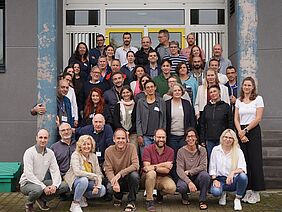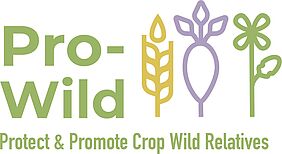"Pro-Wild", short for "Protect and Promote Crop Wild Relatives", is focused on three of Europe’s most widely cultivated crops: wheat, sugar beet, and oilseed rape. The development of new varieties has been stressed as a critical means to mitigate the anticipated impacts of climate change. The "Pro-Wild" project aims to better preserve, characterize and exploit the genetic diversity of wild relatives to breed for better-adapted crops.
The project’s core areas
The "Pro-Wild" project, which is running from 2024-2029, will address three core areas:
- In-situ Conservation: Mapping, characterizing and protecting CWR in their natural habitats.
- Ex-situ Conservation: Propagating, conserving, and cataloguing CWR outside their natural environments to safeguard their genetic material.
- Pre-breeding Activities: Identifying desirable traits in CWR and incorporating these traits into elite breeding programs to enhance the genetic diversity and resilience of cultivated crops.
The ultimate goal of "Pro-Wild" is to improve the adaptability of wheat, sugar beet, and oilseed rape to changing climatic conditions while maintaining resistance to pests and diseases and improving end-use quality. By reintegrating the genetic diversity of wild relatives, the project aims to enhance the sustainability and security of agriculture in Europe and beyond, with project partners in Turkey and Israel.
First meeting of partner institutions in September
The project officially kicked off in the first week of September with a meeting in Clermont-Ferrand, France. Representatives from the 19 international partner institutions gathered to outline the project's roadmap and collaborative efforts. The project is managed and coordinated by the French National Research Institute for Agriculture, Food and Environment (INRAE), one of Europe's leading research institutions in agriculture and environment.
FiBL Switzerland will manage and coordinate the communication, dissemination, and exploitation of the project’s activities, progress, and results. The goal is to effectively inform both the general public and the specialist community through a variety of channels. Additionally, materials will be made available to create added value for both the economy and society.
"Pro-Wild" is funded by the European Union under the Horizon Europe program, with support from UK Research and Innovation (UKRI) and the Swiss State Secretariat for Education, Research and Innovation (SERI).
Further information
Contacts
Links and social media
- pro-wild.eu: Website of the project
- fibl.org: The project in the FiBL project database
- linkedin.com: "Pro-Wild" on LinkedIn
- x.com: "Pro-Wild" on X
Project partners
- INRAE, National Research Institute for Agriculture, Food and the Environment, France
- IAM, Institut Agro Montpellier
- WEIZMANN, Weizmann Institute of Science, Israel
- IPK, Leibniz Institute of Plant Genetics and Crop Plant Research, Germany
- BOKU, University of Natural Resources and Life Sciences Vienna, Austria
- ARO, The Agricultural Research Organisation of Israel – The Volcani Centre, Israel
- CREA, Council for Agricultural Research and Economics, Italy
- UNIPG, University of Perugia, Italy
- UNIPA, University of Palermo, Italy
- CUK, Çukurova University, Türkiye
- INN, Innolea, France
- KWS, KWS SAAT SE & Co. KGaA, Germany
- IT, INRAE Transfert SAS, France
- ELGO, Hellenic Agricultural Organization – Dimitra, Greece
- IfZ, Institute of Sugar Beet Research, Germany
- HCC, Highclere Consulting, Romania
- SV, SESVanderHave, Belgium
- FiBL, Research Institute of Organic Agriculture, Switzerland
- JIC, John Innes Centre, United Kingdom





